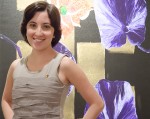Julianna Corrao stood on a cross country course, her hands on her knees, panting. Her junior year fall season was over, and she had finished three spots away from going to the state finals.
The first-year psychobiology student vowed to start preparing for her senior year cross country season. She started training again, and by May she didn’t think the swollen left knee that had formed during her training was anything more than a muscle torn from overuse.
By spring, she was diagnosed with osteosarcoma, a type of bone cancer, in her left knee. It meant she would have to undergo a total knee and partial femur replacement surgery. It also meant she would never run again.
Ten months after her diagnosis, Corrao was osteosarcoma-free after 29 sessions of chemotherapy. On Monday night, she spoke about her experience at the third annual Rock Out for a Cure, a concert of five performances held in Kerckhoff Grand Salon to encourage more people to raise support for cancer patients.
The show, organized by the organization Colleges Against Cancer, focused on publicizing its largest upcoming fundraiser, Relay for Life, a 24-hour walkathon taking place in April at UCLA. Relay for Life raises money for the American Cancer Society, said Montana Upton, a third-year neuroscience student and co-chair for Rock Out for a Cure.
Luminaria bags with tea lights and chandeliers lit the Kerckhoff Grand Salon. Standing upright behind a podium at the front of the crowd, Corrao, the only speaker at the event, told her story.
“I was chosen by cancer but not everyone gets to say that ‘I am a survivor,'” she said at the event.
Julianna’s twin, Alessandra Corrao, a first-year microbiology, immunology and molecular genetics student, was one of about 80 people in the audience Monday.
She said her sister, Alessandra Corrao, was her “number one support system” throughout the ordeal of chemotherapy treatments, starting in June 2012 and ending in February of last year.
Alessandra Corrao was in her sister’s bedroom the day her mother told Julianna that an MRI had shown a tumor in her left knee. Her mother was crying, Alessandra Corrao was frozen and Julianna was repulsed. She knew the tumor probably meant cancer.
Alessandra Corrao said she had to snap back to reality. She told her sister to stop crying and held her tight.
“I told her, ‘You’re a strong person and you’re going to get through this.’ I told her I would do whatever it took to help her – that I wouldn’t leave her and she wouldn’t leave me,” she said.
At that time, Alessandra Corrao realized her family would have to form a support system – not just for her sister, but for all of them.
“Juli was essentially a part of me – she was my sanity, she was my light. I wasn’t about to lose a part of myself,” she said.
Julianna Corrao had chemotherapy for roughly five days each week in the hospital. When at the hospital, she always brought the same neon green blanket and matching pillow case with peace signs that her teammates made her when the treatment began. Her mom always brought the same picture of her twin daughters with long brown hair to pin to the wall.
Corrao said she dropped 20 pounds almost immediately, leaving her weight hovering around 70 pounds.
“I don’t think I processed it until I had to actually get chemo and feel that first treatment. It was the hardest because I didn’t know what to expect – I knew you felt horrible, but I didn’t know how horrible,” she said.
The fast pace of the treatment’s effects was “unreal,” Alessandra Corrao said. Julianna went from being healthy and active to suddenly bedridden – and her sister was not prepared for it.
“I would walk into her room and there would just be an empty bed there because she would be in a hospital bed on the other side of town.” Alessandra Corrao said. “I didn’t realize how strong our connection was until she was gone.”
The sisters would spend their time in the hospital doing homework to keep up in school, working on college applications or watching television. Corrao’s mother quit her job as a mail carrier to spend more time with her daughter. When Corrao lost her hair in chemo, her sister shaved her hair into a mohawk to show support.
Corrao said she always knew with the help of chemotherapy she could beat her cancer.
But sometimes she faltered in her faith for her recovery.
“With chemo they have you like right above death, that’s how I felt,” Corrao said. “And sometimes I would just ask myself, ‘What am I doing?'”
Corrao’s knee surgery took place in September, and after having to relearn to walk, she was released from the hospital in February of 2013. When she walked out the doors, she said she was never going back.
Back at high school, Julianna Corrao won prom queen and graduated with her class. Both she and her sister were accepted to UCLA and, one year later, Corrao is still cancer-free.
Because the first five years after recovery are the most critical, every three months Corrao’s body and lungs are scanned to confirm the osteosarcoma has not come back. She said she doesn’t know what she would do if it her cancer came back.
Corrao is now part of the survivorship committee within Colleges Against Cancer at UCLA, and every month she helps deliver gifts to cancer patients in hospitals. She also created a 20-person team with her sorority, Alpha Gamma Delta, to participate in Relay for Life and raised $1,000.
But Corrao said she still hasn’t found something to replace running in her life.
Until then, though, Corrao has her sister for support.
“You need a support system,” Alessandra Corrao said. “It’s really hard to break a bond as strong as ours.”
